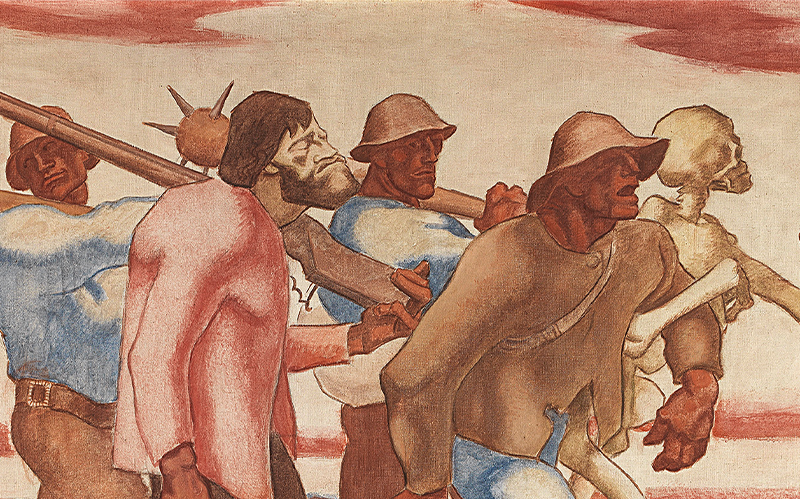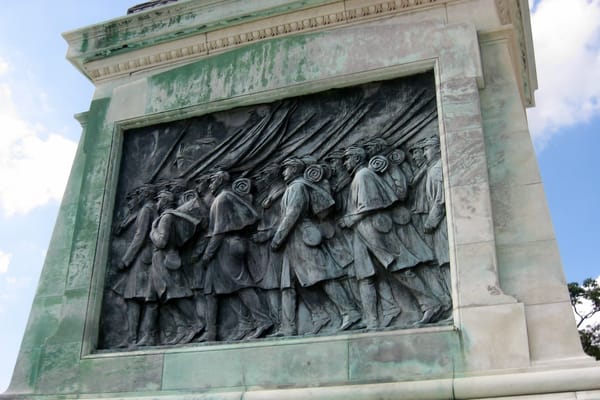The Warmonger Rebrand
Rebranding the Department of Defense as the "Department of War" is one more proof of Trump II's bellicose intentions.

On September 5, President Trump issued an executive order rebranding the Department of Defense as the “Department of War.” The order boasted that the U.S. military is “the strongest and most lethal fighting force in the world” and that this department “should have a name that reflects its unmatched power and readiness to protect national interests.” He bizarrely ranted that since Congress consolidated the War Department and the Department of the Navy as the DoD in 1949 that the United States “never fought to win” in the interceding wars.
Oddly, Trump’s renaming has attracted support from many analysts and politicians who want a more restrained, less militarized foreign policy. They include both Buchananite nationalist conservatives, leftist commentators, and some mainstream outlets.
Their main argument is that calling it the Department of War honestly describes the militaristic nature of the U.S. role in the world and the Defense Department’s activities. The new name, they hope, will force Americans to reckon with their overextended global military and unnecessary wars that have nothing to do with actually defending the homeland.
Dan Caldwell, a former advisor to Defense Secretary Hegseth, contended that “The U.S. became a much more interventionist power after the creation of the Department of Defense…Renaming DoD the Department of War is just acknowledging the reality of what DoD’s actual role has been the last 80 years.” This convoluted claim would be news to the Latin Americans, Filipinos, Hawaiians, and Native Americans who faced U.S. conquerors through the previous centuries.
Left-wingers such as Glenn Greenwald, Jason Hickel, and Medea Benjamin all praised the decision as “infinitely more honest.” Nathan Robinson of Current Affairs speculates that the new name will “make it more obvious that the U.S. state is a warmongering aggressor” and thereby make it “easier to defund,” as if Trump has shown any interest in reducing defense spending.
In its desperation to give Trump the benefit of the doubt whenever possible, the Washington Post editorial board praised the rebranding as “a blow against government euphemism” that might “be followed by clearer thinking about the military’s home at war and abroad.” Trump’s deployment of National Guard troops to U.S. cities, they conjecture, “might prompt more opposition to their deployment” if done under the name Department of War rather than Defense.
In short, these analysts think that calling it the Department of War sheds the illusions and exposes the violence inherent in U.S. foreign policy. They also hope, as Sohrab Ahmari suggests, that the relabeling will inspire Congress to reassert its constitutional power to declare war after a long period of passivity, which was enabled by the “euphemism” of defense.
But these hopes are misguided. They are projecting their desire for a restrained, demilitarized foreign policy onto Trump, who is in fact hyper-militarizing American foreign policy and domestic life. They are offering him cover as he pursues an increasingly reckless and unilateral foreign policy and politicizes the U.S. military.
The White House’s own executive order shows that the rebranding is about readying the country for war, not reeling it in. It reads: “The name ‘Department of War’…demonstrates our ability and willingness to fight and win wars on behalf of our Nation at a moment’s notice, not just to defend.” Secretary of Defense Pete Hegseth was even blunter: “We’re going to go on offense. Not just on defense. Maximum lethality, not tepid legality. Violent effect, not politically correct.” Senator Mitch McConnell added that the renaming should lead to even more defense spending in order to “preserve American primacy.”
These attitudes, coupled with the gutting of the State Department and other non-military agencies, makes it clear that Trump intends to rely more on the use of force, not less. He has also taken a more militarized approach to the border, backed Israel’s continued obliteration of Gaza, and launched an unprovoked strike on Iranian nuclear facilities, and illegally destroyed a suspected Venezuelan drug smuggling vessel.
This militarism is spreading at home as well. Hegseth and the MAGA universe champion militarized masculinity that makes a fetish of “operator culture” and the “warrior ethos” while denigrating liberals, women, and LGBT people for making the military “effeminate.” Trump has also sent U.S. soldiers into cities under the pretext of fighting crime. He recently threatened the city of Chicago, saying that it was “about to find out why it’s called the Department of WAR.”
Defenders of the rebranding are ignoring what Trump is doing and saying in front of their faces. These are not the actions nor the language of someone who seeks to demilitarize U.S. foreign policy. Trump, Hegseth, and others in his orbit believe that the United States lost the wars in Iraq and Afghanistan because they failed to apply enough lethal force, which was the fault of weak-kneed liberals. As Trump stated last week: “We could have won every war, but we really chose to be very politically correct, or wokey, and we just fight forever.” They are dangerous militarists who seek to center U.S. strategy on the use of violence; the name “Department of War” reflects that ambition.
Keep the name
The Department of Defense is the proper name for two reasons. First, it reflects the fact that the DoD does a lot more than war. The name reflects a more holistic conception of U.S. national security, and the Department itself features many agencies that perform a host of varied tasks beyond the use of force.
Jack Hunter of Responsible Statecraft claims that “The Department of Defense should be called the Department of War again, but that’s what it was, and that’s what it is.” This is a vast oversimplification. The Department of Defense plays a variety of roles besides fighting wars. Its dozens of agencies engage in humanitarian assistance, civil engineering projects, legal training for developing nations, partner exercises, intelligence sharing, anti-piracy, freedom of navigation, counter-drug operations, and the repatriation of Islamic State fighters’ families.
All of these activities, and the forward posture of U.S. forces in key strategic zones, allow the United States to deter aggression, maintain economic openness, and cultivate relationships with allies. The term “defense” promotes a “comprehensive and continuous program of national security,” to borrow Truman’s words from 1945, that reflects the realities of an interdependent world. In my three years as a professor at the U.S. Naval War College, which educates mid-career officers, the faculty emphasized the importance of deterrence for preventing war, the need to integrate the use of force with other instruments of statecraft, and the importance of cooperating with allies and non-DoD agencies.
It is more than reasonable to argue that the DoD is too big and has usurped the functions of other agencies, especially the State Department. But changing the name will not solve those problems, and it will only encourage the DoD to focus on the use of force at the expense of other roles.
Second, emphasizing defense is preferable for normative reasons. As historian Melvyn Leffler argues, the term “defense” was intentionally chosen at a time of heightened risk of nuclear war with the Soviet Union. President Harry Truman aimed to “deter future wars, rather than to wage war,” as Leffler puts it. The creation of the DoD also came as the United States and its allies were establishing a regime of international law in which war was justified only in the name of self-defense or the defense of other states against aggression.
The Atlantic Charter, signed in 1941 by President Roosevelt and Prime Minister Churchill, stated that their nations “seek no aggrandizement, territorial or other” in the struggle against fascism and defended the right of all countries to their territorial integrity against aggression. The UN Charter, signed in 1945, recognized “the inherent right of individual or collective self-defense” for all member states. Furthermore, at the Nuremberg and Tokyo trials following World War II, the United States and its allies advanced the novel principle that states and individuals can be held responsible for the crime of aggressive war. Just because the United States has not always lived up to these worthwhile ambitions does not mean they and the term “defense” should be abandoned.
The renaming not only goes against the spirit of the post-World War II system but makes it easier for rivals like China and Russia to portray the United States as a serial aggressor. As one DoD official lamented: “it will be used by our enemies to portray the United States as warmongering and a threat to international stability.” The United States is now the only country in the world to have a “War” Department.
The U.S. role in the world should be constantly re-examined, and there is a strong case that we have relied too frequently on the military instrument of power in the recent past. But renaming the DoD as Department of War will not, by some reverse trickeration, prompt more critical thinking. Trump and his minions are not interested in strategic restraint but in militarizing U.S. foreign policy and bringing the war mentality to American cities. His rebranding is part and parcel of this larger campaign. Both should be opposed.
Featured image is "Totentanz 1809," Albert Eiger-Lienz 1916.




